Peter MALONE
Saturday, 18 September 2021 19:53
Where the Boys Are/ 1960
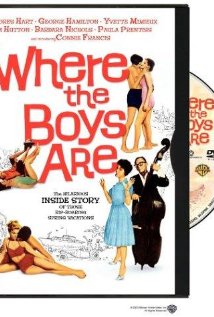
WHERE THE BOYS ARE
US, 1960, 99 minutes, Colour.
Dolores Hart, Connie Francis, Paula Prentiss, George Hamilton, Jim Hutton.
Directed by Henry Levin.
Where the Boys Are is one of those typical MGM musicals of the sixties, aimed at the youth audience. This one is a bit better than usual. It reflects the times and may seem dated now. However, it has a light breezy touch, especially in the personality of the stars. It is certiainly a take it or leave it musical, remade in 1984.
1. A successful a comedy drama? Target audience? Conventions of comedy, well-used?
2. The 1960s setting, changes since then, younger people? Styles, meaning of life? Despite the surface changes, real change?
3. A comedy of manners? Picture of American life-style? The manners all US college youth in the 1960s? The importance of the police warning to the younger officers?
4. The picture of pre-Vietnam American youth? Post-Vietnam? youth? The changes and why?
5. The customs and mores about behaviour and sex, the 1960s, later? Outspokenness, the fact of more words than action?
6. How much satire on the young students? How much was realistic? Realistic story or contriving to show various incidents in a compressed time?
7. The contrast between Fort Lauderdale’s weather and the snow? The class atmosphere, Merritt talking freely in class, interview with the Head, the reality of life and the holiday?
8. The phenomenon of subculture of students at Fort Lauderdale?
9. The importance of the car-ride, picking up the stranger, paying for rooms, budgeting, going for swims? How interestingly and attractively was this portrayed?
10. The title, illustrated at Fort Lauderdale? Friendship, relationships between boys and girls? Pros and cons?
11. How real was the story of Melanie and the boys, credible? The influence of Merrit’s talk? Her being alone, wanting to love, the melodrama of her wandering the town?
12. How entertaining was Tuggall? How real, ironic? How genuine for laughs? The TV matching her comic character? The importance of the Lola interlude and the realisation of love? How optimistic the relationship?
13. The comedy of Angie and Basil? Angie and the hockey…? Her songs and Basil’s music? Comedy, satire? How well does the comedy?
14. The relationship between Merritt and Ryder as the center of the film? Sophistication, wealthy background, high IQs, the nature of their talk? Ryder’s permissiveness and Merrit’s doubts? How genuine the relationship?
15. The sharp observation of the varying characters? Consistency in their dramatisation?
16. What did the film have to say about love, permissiveness, sexuality, realism? The moral stance? Judgments or not? The value of this film in its time,
now, despite the change of style?
Published in Movie Reviews
Published in
Movie Reviews
Tagged under
Saturday, 18 September 2021 19:53
Wanted: Babysitter
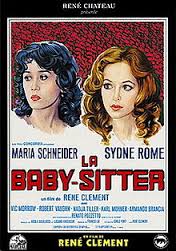
WANTED: BABYSITTER
France/Italy, 1975, 110 minutes, Colour.
Maria Schneider, Sydne Rome, Robert Vaughan, Vic Morrow.
Directed by Rene Clement.
An entertaining mystery crime thriller, directed by Rene Clement, veteran of so many excellent thrillers from Full Sun to Rider on the Rain. It is not in the same class as his early work. Of interest are the stars: Maria Schneider soon after Last Tango in Paris and The Passenger and Americans, Robert Vaughan and Vic Morrow. Sydne Rome also has quite a good role. The material is fairly conventional but treated straightforwardly and entertainingly.
1. Interesting thriller? Audience involvement in the mystery, motivation, solutions?
2. The international flavour? Locations, stars?
3. Thriller conventions, the world of the wealthy, heroine, criminals, kidnapping, murders?
4. The wealthy, the world of crime, ambitions? Careers and success, fading actors’ careers? Cruelty, lack of scruple, the trail, death? Audience interest in this kind of world?
5. The initial focus on Anne, attractive, her accident, growing cruelty and selfishness? Depression? Relationship with Chase? Skill as an actress, her exploiting this in the scheme? Friendship with Michelle, yet her cruelty? Well delineated character, deviousness, repentance? Ugliness of her suicide?
6. Transition to Michelle as heroine? Attractive personality, kindness, becoming a victim as she was more and more implicated in the plot? At work, her skill as a baby-sitter? Being tricked, imprisoned? The effect, her relationship with the boy? A mixture of desperation and resourcefulness? The note and the dog? Her boyfriend, his attempted helping? Her ultimate heroism?
7. The mystery elements, veiled from the audience, the presentation of Henderson, his motives, the actual revelation of the complications at the end?
8. Chase and Lotte? The characters, careers, relationship, motivations, cruelty, ambitions, their deaths? As villains?
9. The killer, personality, the group with the kidnapping, the sadistic jailing and tormenting?
10. The boy and his father, his place in the family, being kidnapped, the effect of the imprisonment on him, the bond with Michelle?
11. Franklin and his liaison with Anne, the vengeful response of Anne to his leaving her, setting in motion the kidnapping and the deaths?
12. Murder thrills, themes of right and wrong, responsibilities, guilt? The emotional response to thrillers and their values? Communication and values through thrillers?
Published in Movie Reviews
Published in
Movie Reviews
Tagged under
Saturday, 18 September 2021 19:53
Heights
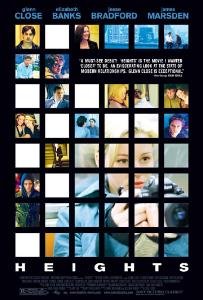
HEIGHTS
US, 2004, 93 minutes, Colour.
Glenn Close, Elizabeth Banks, James Marsden, Jesse Bradford, Thomas Lennon, Matthew Davies, Dennis O' Hare, Rufus Wainwright, Eric Bogosian, George Segal.
Directed by Chris Terrio.
You may have to search hard to find a screening of Heights. It is one of those well-written and well-acted dramas that appeals to a limited audience. It is considered ‘art-house’ cinema. Maybe it is, but it is an interesting character study nonetheless. However, it limits itself in its ability to create really rounded portraits because the action takes place over twenty four hours and a lot happens to the characters, not so much in events as in emotions.
Not unlike a film like Nine Lives, Heights displays captions to highlight the characters the film-makers want us to pay attention to. Often there are two names and we have to watch the relationship. At one stage, two names appear but one of the characters is never seen, phones and is talked about and has a determining role in the outcome.
Again, the screenplay is based on a play by Amy Fox. While the film is opened out, it is not difficult to appreciate how it would have worked in the theatre.
For some there are heights, for others depths. This is a New York story, a story of apartments, of theatre – stars, directors and aspiring actors – of affluent celebrities and of young adults desperate to have successful careers. It is also one of those ‘six degrees of separation’ stories, plausible but still a bit difficult to accept the interconnections because they all have to be made in the one day.
The central character is a talented photographer who is about to marry. She is played by Elizabeth Banks. Her fiance is James Marsden who is concerned about wedding rehearsals and confiding in his rabbi (George Segal). She is sacked during the day, gets a great opportunity to go on a photo-shoot overseas, is pursued by a past friend (Matt Davis), has to deal with her prima donna mother who dislikes her fiance and, finally, has to deal with her decision about marrying. All the degrees of connection can be linked to her.
Her mother is Glenn Close, a Broadway star rehearsing Macbeth, directed by her husband, Eric Bogosian. She is a woman of definite opinions, temperamental who decides to take up a young man at an audition as a protégé (Jesse Bradford) and invites him to her soiree. The reason he does not ultimately go leads to a dramatic surprise and the reason for the resolution of the whole piece. There is also a significant plot device where a gay photographer is mounting an exhibition of photos, including men that he has had relationships with.
Audiences will not miss not seeing it, but will be interested if they do.
1. The title, expectations?
2. The play as a basis, opened out, the dialogue and the emphasis on characters and speech? Situations?
3. New York City, homes and departments, the world of the theatre, business? The musical score?
4. The ensemble cast, their strengths? The guest appearances?
5. The interconnections between the characters? The challenges?
6. 24 hours, experiences, the challenge for change?
7. Isabel at the centre, character, age, experience, the engagement? Jonathan, his personality, the relationship with Isabel? The Jewish issues, going to see the rabbi? The personality of the rabbi and his influence? Jonathan, having to think about himself, opening up, surprise, the consequences for the engagement? Isabel, the encounter with Peter, the journalist, interactions?
8. Diane, as wife, in the open-marriage? As a mother? Control? Her influence on Isabel, their interactions? The theatre world, performance, real and artificial? The addition of the young actor, her response to him, the effect?
9. The actor, young, coming to the audition, his performance, Diane, her response, his response to her?
10. Diane’s husband, having the affair, his character, the open-marriage, values, consequences?
11. The range of incidental characters, in the lives of the central characters, at the theatre, the situations, the interconnections?
12. The story of New Yorkers, their life and style? Universal themes and values?
Published in Movie Reviews
Published in
Movie Reviews
Tagged under
Saturday, 18 September 2021 19:53
Guy X
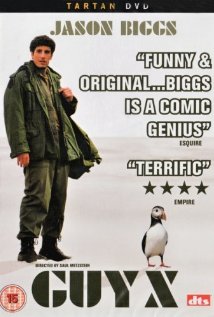
GUY X
Canada/Iceland/UK, 2005, 101 minutes, Colour.
Jason Biggs, Jeremy Northam, Natasha Mc Elhone, Michael Ironside.
Directed by Saul Metzstein.
Decades after M*A*S*H and Catch 22, we think we are used to satire on the American military, but this one takes us somewhat by surprise. It looks as if it is serious. It opens with a young man being dropped in Greenland for a tour of duty. But there is something askew. He is dropped from the plane which takes off – and then we find he should be in Hawaii and authority will not accept he is who he is. And what is going on in this base – in Greenland? We are in Catch 22 territory.
The original novel by John Griesemer is called No One Thinks of Greenland. That should give some clues and tone.
The base is filled with eccentrics and misfits – and holds a very dark secret which makes the latter part of the film and the destruction of the base all the more sinister in the light of American troops and the war in Iraq and the wounded and the veterans.
The cast is also unusual. Jason Biggs has grown out of American Pie films and has appeared with Woody Allen in Anything Else. Here he has to hold interest as the centre of the film, which he does well. Jeremy Northam sporting a broad American accent is the commandant. Natascha Mc Elhone is his assistant who gets caught up with our hero. Michael Ironside the veteran of so many action films has a very different role as a maimed and wounded patient.
The trouble after Catch 22 and M*A*S*H is that what seems patently absurd up there on the screen is replicated at times in real life – and that isn’t funny. Which is, probably, the point of the film.
1. The title, the focus? The book title and No One Thinks of Greenland?
2. A military satire, in the tradition of M*A*S*H, Catch 22? The development of this kind of satire by the 1990s?
3. The Greenland setting, geography, weather? The army base? The islandt? The hospital, the interiors, secret world? The musical score?
4. Rudy in himself, in the military, his experience, dropped in Greenland, the mistake, not Honolulu? His response, trying to explain to the authorities, to Woolwrap, no explanations accepted? His having to stay, his tasks? The paper, editing it, the propaganda? His reaction? The absurdity of the situations?
5. The other men at the base, offices, soldiers, the way of life, the management, the mission of guarding?
6. Woolwrap, in command, mad intensity, his orders, his relationship with Irene, his reaction to Rudy, giving him orders, the paper, his intentions? The discovery of the hospital, the soldiers, his mission – to what purpose? Rudy confronting him?
7. The soldiers, the Vietnam experience, the injuries, physical, psychological? Prosthetics? The experiment? Rudy and his interaction with the soldiers, the discoveries? Guy X and his injuries, character, communication with Jason? The importance of the conversations at the effect of Rudy and his wanting to unravel the truth?
8. Irene, her character, place of the base, her work, with Woolwrap, with Rudy, his attraction? The consequences?
9. The film as a satiric experience?
Published in Movie Reviews
Published in
Movie Reviews
Tagged under
Saturday, 18 September 2021 19:53
Christmas Tree Miracle, A
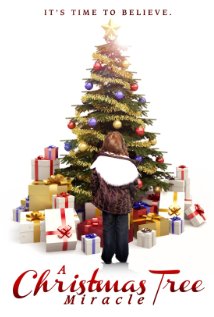
A CHRISTMAS TREE MIRACLE
US, 2013, 102 minutes, Colour.
Kevin Sizemore, Claudia Esposito, Terry Kiser, Barrett Carnahan, Emily Capehart, Siomha Kenney.
Directed by J.W.Myers.
A Christmas Tree Miracle is a family – oriented film, American-style. It resembles many of the dramas which come from faith-based production companies. However, while there are some scenes in church and discussions about miracles, glimpses of cribs, the film is fairly secular in tone.
We are introduced to the George family, a not very attractive group, the father is business-preoccupied, the mother impatient, the teenage daughter self-centred and preoccupied with texting, her friends and fashion, the teenage son more interested in his girlfriend, tense with his father. However, the little daughter, Nina, is perpetually cheerful, speaks very directly, plays the cello. Unlikely as it may seem, we know that they are all going to be pleasant at the end.
The family has been living beyond its means when the father is retrenched. He fails to find a job, is too proud to tell his children the truth until there is a blow up and they are shocked. His wife asks her sister. The father goes to his father to ask help and is quite strongly reprimanded for his selfishness and his failure to live up to promises in the past. The family has to sell their possessions, sell the house, moving to a motel from which they are ousted, have to line up for food.
However, the father has done a kind deed in passing to an old man sitting in a diner. The son has saved a student at school from bullying. These kindnesses will be rewarded, especially from the old man sitting in the diner who owns a Christmas tree farm, giving the trees away. Inviting the family to live with him and they, of course, find redemption as well as a greater simplicity of life and generosity.
1. A Christmas film, a family film, for adults, the teenagers, the young children? The impact for each?
2. The American story, locations, the city, homes, the countryside, the tree farm? Authentic feel? Musical score?
3. The title, the touches of sentiment, the focus on the trees at the tree farm, giving away the trees, acts of kindness, no coincidences, the miracles?
4. The initial presentation of the George family? The taking of the photo, the grumpiness of the family, Nina, her cello, smile? The photo for the Christmas
card? And its effect, especially on Mr King?
5. The off-putting manner of the family, the mother and her impatience and off handedness, the father and his concern about business and work, phone calls, Natalie and her continued texting, moodiness? Nick and his self-centredness, girlfriend? The bickering, the children and the touch of the narcissistic? Nina as a breath of fresh air?
6. Nina, the performance with the cello, Nick with his girlfriend, Natalie text in, her walking off, her mother saying that nobody cared?
7. The economic situation? Charities? Downsizing? Unemployment and job search? Affluent families, living beyond their means, sudden poverty? On the breadline? Selling possessions, homes?
8. David, 20 years work, his being fired? His reaction? Julie’s response? Having to compromise? Natalie and her moodiness, Nick, his car, wanting pizza…? Nina and her directness, support of her parents, cheerfulness?
9. David, in the diner, the young man wanting to oust Henry, David giving him the coffee? Later David being in the same position as Henry?
10. The search for work, the months passing, the sales? David not wanting Julie to work? The blow up, the revelation of the truth? The reactions?
11. Julie going to see her sister, the offer of help, the sale of the jewellery? David going to see his father, his father reminding him of his promises in the past and his failure to keep them? Saying that the money would last only a couple of months, the need for a radical re-think?
12. Having to sell the house, the move to the motel, only the necessities? The creditor, their having to move out of the motel? Going to the church, paying for the pews, Henry in the church?
13. The Christmas tree theme, Nina and love of Christmas trees? Her writing on the can of peas about a miracle? Their getting their can back from the charity?
14. Lining up for food, Julie meeting her friends, her friend’s discretion, especially after her supporting Alicia with her ambitious senator husband? Natalie and her meeting Tessa, everything destroyed in the fire, their becoming friends? The irony of Tessa having the coat that Natalie disliked and gave away?
15. Going to the tree farm, the millions of trees, Henry and his story, the death of his wife, the story of his courting her, their daughter and her illness? Giving away the trees – and people giving goods in return? Offering the family to stay, their working, the effect on each of them, the good hard work, Nick liking it, Natalie making her dresses, Nina and her looking at all the trees?
16. The offer for them to stay? David and his trying to persuade Henry to sell? David contacting the senator, his campaign, the wealthy man and his need for warehouses? Henry not wanting to sell?
17. The sadness of Henry’s death? The family wondering what they would do? David and his change of heart about the sale, phoning the senator? The lawyer arriving, the estate left to the family? The senator arriving, pressurising the sale. Mr King, his listening to Nina play the cello, the memory of the Christmas card that David sent when he was sacked? Mr King allowing them to stay, Natalie and her dresses, Nick and his having saved the young boy from bullying at school, his father getting the tree, associated with the University, Tom and his studying ecology?
18. The emphasis on kindness to others – and the possible miracles that ensue?
Published in Movie Reviews
Published in
Movie Reviews
Tagged under
Saturday, 18 September 2021 19:53
Mr Bean'S Holiday
MR BEAN’S HOLIDAY
UK, 2007, 90 minutes, Colour.
Rowan Atkinson, Emma de Caunes, Willem Dafoe, Jean Rochefort, Karel Roden.
Directed by Steve Bendelack.
For the loathers, it is important to note that Mr Bean is far more benign in this film than in the past. He is not nearly so mean or downright nasty. He does have a few of these moments, as when he slides all his uneaten oysters into a lady’s bag at a fashionable Paris restaurant. But by and large, he is far more kind than we might ever have expected him to be.
For those who love him, this incipient niceness may be a put off. His self-satisfied oneupmanship or his desperate trying to save himself in awkward situations may have been part of his past appeal.
Mr Bean wins a raffle at the local church which sends him off to Cannes for a holiday with a videocamera and an envelope of euros. The video camera features in a lot of the gags and amusing use is made of the footage during the Cannes film festival.
Basically, Mr Bean has troubles on his way to Cannes, getting on and off trains and entangling himself with the stranded son of a Russian director whom he had persuaded to film him getting on the train and who subsequently found the doors shut on him. After various mishaps, after busking with the boy to an operatic aria to great acclaim, he finds himself on the film set of a commercial using the Nazi invasion of France. Needless to say he causes mayhem for the pompous director. He gets a lift from the actress, is reunited with the boy and then gate crashes a premiere where the star has a cameo in the pompous director’s film.
There are a lot of sight gags which fans will enjoy. Mr Bean, at this stage of his life, seems a cross between Jacques Tati and Jerry Lewis.
Film buffs will enjoy the scenes with the director, Willem Dafoe, especially the screening of his pretentious, existentialist arthouse film which he wrote, produced, directed, starred – and basked in self-satisfaction during its screening while everyone else slept or fidgeted. When it is interrupted with Mr Bean’s visuals along with the director’s voiceover, it is a hit!!
Director, Steve Bendelack, has a twenty year history of directing much satiric television including Spitting Image, The League of Gentlemen, French and Saunders, The Royle Family and Little Britain.
Rowan Atkinson used to be more acerbic as Mr Bean and, especially, as Blackadder. Since the Johnny English shenanigans, he has become more benign, aiming at a broader audience.
UK, 2007, 90 minutes, Colour.
Rowan Atkinson, Emma de Caunes, Willem Dafoe, Jean Rochefort, Karel Roden.
Directed by Steve Bendelack.
For the loathers, it is important to note that Mr Bean is far more benign in this film than in the past. He is not nearly so mean or downright nasty. He does have a few of these moments, as when he slides all his uneaten oysters into a lady’s bag at a fashionable Paris restaurant. But by and large, he is far more kind than we might ever have expected him to be.
For those who love him, this incipient niceness may be a put off. His self-satisfied oneupmanship or his desperate trying to save himself in awkward situations may have been part of his past appeal.
Mr Bean wins a raffle at the local church which sends him off to Cannes for a holiday with a videocamera and an envelope of euros. The video camera features in a lot of the gags and amusing use is made of the footage during the Cannes film festival.
Basically, Mr Bean has troubles on his way to Cannes, getting on and off trains and entangling himself with the stranded son of a Russian director whom he had persuaded to film him getting on the train and who subsequently found the doors shut on him. After various mishaps, after busking with the boy to an operatic aria to great acclaim, he finds himself on the film set of a commercial using the Nazi invasion of France. Needless to say he causes mayhem for the pompous director. He gets a lift from the actress, is reunited with the boy and then gate crashes a premiere where the star has a cameo in the pompous director’s film.
There are a lot of sight gags which fans will enjoy. Mr Bean, at this stage of his life, seems a cross between Jacques Tati and Jerry Lewis.
Film buffs will enjoy the scenes with the director, Willem Dafoe, especially the screening of his pretentious, existentialist arthouse film which he wrote, produced, directed, starred – and basked in self-satisfaction during its screening while everyone else slept or fidgeted. When it is interrupted with Mr Bean’s visuals along with the director’s voiceover, it is a hit!!
Director, Steve Bendelack, has a twenty year history of directing much satiric television including Spitting Image, The League of Gentlemen, French and Saunders, The Royle Family and Little Britain.
Rowan Atkinson used to be more acerbic as Mr Bean and, especially, as Blackadder. Since the Johnny English shenanigans, he has become more benign, aiming at a broader audience.
Published in Movie Reviews
Published in
Movie Reviews
Tagged under
Saturday, 18 September 2021 19:53
Enemy of the State
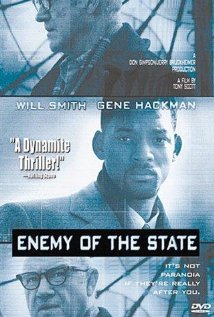
ENEMY OF THE STATE
US, 1998, 132 minutes, Colour.
Will Smith, Gene Hackman, John Voight, Lisa Bonet, Regina King, Stuart Wilson, Loren Dean, Barry Pepper, Ian Hart, Jake Busey, Scott Caan, Jason Lee, Gabriel Byrne, James Le Gros, Jack Black, Jamie Kennedy, Grant Heslov, Jason Robards, Philip Baker Hall.
Directed by Tony Scott.
Enemy of the State is a rattling good conspiracy yarn directed at full pace by Tony Scott (Top Gun, Crimson Tide), and photographed and edited excitingly. It is also alarming in its themes of almost universal surveillance, especially by National Security and other government organisations (the equivalent of other nations' secret police).
Will Smith plays a hot-shot lawyer who accidentally finds himself in contact with an old friend and then finds that he is pursued by agents who watch his every move (even on video monitors). Jon Voigt is proving a fine suave movie villain in his later career and Gene Hackman enjoys himself with another crusty heroic role. The plot is complicated but every strand is used, especially in the climax. A really entertaining and thoughtful show.
1. An expert thriller? American politics? Security? Surveillance? Technology developments? Pre-9/11?
2. Washington DC, the city, Georgetown, the neighbourhoods, the countryside, the lake?
3. The editing, the pace? Musical score?
4. The interconnection of all the story strands?
5. The pre-credits, the Republican Congressman, his dog, Reynolds and his approach, his henchmen, the discussions and threats, the standards of the politician, the political issues about passing bills, security? The risks? The murder?
6. The irony of a birdwatcher and his camera? Collecting the camera? Discovering the images? Sending them to his friend? The gathering of information about him, the chase, through the streets, encountering Robert, the coincidence, planting the film? Fleeing, the further chase, the bike, over the parapet, the truck, his death? Robert’s card and the security check?
7. Reynolds, his personality, at home, his wife? Authoritarian, ambitious and unscrupulous? His staff, his chief adviser supporting him, ideas? The range of surveillance? The interview with the military and their skills? Hiring them as thugs? Collecting information, the satellites, GPS, in action, tactics, violence? The personalities of the thugs, the confrontations, the ransacking of Robert’s house and taking the blender, the letter confrontation about it?
8. Robert, the law, his meeting, Rachel, the connection with Brutal? The cash, the bank statements? Jobs’ consultancy? Christmas, going into the shop, the lingerie, the comedy? Explanations? His wife, strong views against over-surveillance, for rights to privacy? His son, his friend, playing computer games? The agents coming to the door, the interrogations? The couple away, the ransacking of the house? Discussing it with his friend?
9. Rachel, the past, students, the affair, Robert’s therapy? The caution about Brilll? His wife being upset with the contacts with Rachel? Her death, his being framed?
10. Brill, the contact, the brief encounter, the car, ousting Robert?
11. The company, the interviews, his being fired, his reputation? The headlines, damaging his reputation?
12. Travelling in the back of the car from school, safety, his wife and reconciliation, setting up the meetings?
13. Reynolds, watching the screens, his work, the results, his demands?
14. Lyle, the contact, suspicions, Rachel and his story, going to the ferry, Robert following Lyle? His back story, the CIA, Afghanistan, being dropped?
Rachel’s father working together, Lyle’s adopting her, upset, her death?
15. The editing and pace of the chases, the effects?
16. The Mafia connection, Robert going to the criminal, interrogation, the issue of the tape, Robert’s initial suspicions about the surveillance, the Mafia?
17. The ferry, Rachel’s information, following Lyle, his being taken?
18. With Lyle, the discussions? Lyle’s diabetes, needing food, the stop, the phone call, the connection with Reynolds? The CCTV, following, going to the warehouse, further information, packing, the attack, the escape, Lyle exploding his building?
19. Lyle, the deal with Reynolds, disguises a policeman, the information, his being taken, Robert taken? Giving the address, the irony of the Mafia, the FBI surveillance, their questions about the vehicles?
20. Inside, with the Mafia, the double meaning, two versions of the tape, intentions, the gunmen entering, the shooting, the deaths?
21. Lyle acknowledging that Robert had been smart? Lyle installing surveillance and Robert’s home, Robert waiting to him?
22. The Congressman and his mistress, the surveillance? The footage and using it?
23. The official political investigations and meetings, Reynolds and his presence, the accusations, his being called out? The end of his career?
24. The using of surveillance developments against the exploiters?
25. The overall effect, terrorism pre-9/11, surveillance – and the relevance of this story after 9/11?
Published in Movie Reviews
Published in
Movie Reviews
Tagged under
Saturday, 18 September 2021 19:53
Undiscovered
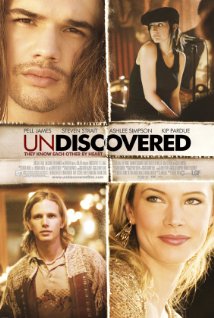
UNDISCOVERED
US, 2007, 97 minutes, Colour.
Pell James, Steven Strait, Kip Pardue, Carrie Fisher, Shannyn Sossamon, Stephen Moyer, Ashlee Simpson, Fisher Stevens, Peter Weller.
Directed by Meiert Avis.
Undiscovered is a small film about the music industry in Los Angeles at the beginning of the 21st century. The focus of attention is Luke, a composer, played by Stephen Strait who gets the opportunity to sing some of the songs.
At the beginning, he has a short encounter with Brier, Pell James, who is a model but goes to Los Angeles after two years to try acting. She meets Luke at the club, is interested in him, asks Carrie, her mentor, to help with all kinds of promotion while Luke is signed by a go-getting producer. The life as a performer, composer and his transformation is too much for Luke and he wants to return to composing and playing in clubs. While he has an on-again, of-again relationship with Brier, she decides to go back to New York and modelling.
Also in the picture is Luke’s brother, played by Kip Pardue, an eccentric musician.
Carrie Fisher and Peter Weller have cameo roles as managers and producers.
1. The music world, Los Angeles style? Composition, performance, ambitions, contracts, managers, publicists?
2. The New York opening, Luke, with Euan, the attraction to Brier, the gloves caught in the door?
3. The range of music, songs, performance, characters?
4. Luke himself, his relationship with his brother, going to Los Angeles, singing in the club, composing? Brier, telephoning Carrie, the advice? Going to LA, becoming a model? Wanting to act, going to the studio, the taunts of the other students? Her visiting the club, seeing Luke and recognising him, the polite conversation, liking, feeling sorry for him, his hopes, contacting Carrie, organising publicity for Luke, on social media?
5. Schwenk, his entourage, public relations, visiting the club, his signing Luke, his spiel?
6. Luke himself, the opportunity, discussions, the contract, recording, the transformation, appearance, with the Brier, on and off relationship, the friendship and his singing?
7. Euan, his character, eccentric, appearance and clothes, the groups, wanting money, later giving money to Luke?
8. The clash with Brier, yet the love, the breakup, Luke and his decision about his future, the truth about himself?
9. The choices of composition, performance? The agent and his being at the club, the discussions, contracting him to be a composer? Meeting Carrie? Brier present, her going to the airport?
10. Brier, her boyfriend, the musician, absent on tour, his returns, plausible talk, sexual relationships, the breakup?
11. Brier and her friend, singing with Luke, advice, present at the end and singing?
12. Luke, leaving the airport, getting a ticket? Holding up the plane?
13. The plans, and the romantic comedy touches on the plane and the take-off?
Published in Movie Reviews
Published in
Movie Reviews
Tagged under
Saturday, 18 September 2021 19:53
For Your Eyes Only
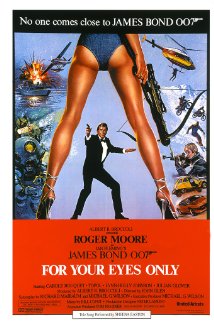
FOR YOUR EYES ONLY
UK, 1981, 127 minutes, Colour.
Roger Moore, Carole Bouquet, Topol, Lynn- Holly Johnson, Julian Glover, Cassandra Harris, Jill Bennett, Michael Gothard, Jack Hedley, Lois Maxwell, Desmond Llewelyn, Geoffrey Keen, Walter Gotell, James Villiers, Charles Dance.
Directed by John Glen.
For Your Eyes Only is the fifth Roger Moore outing as James Bond. It is less extraterrestrial than the previous two films, especially Moonraker, and is a return to the plots from the Ian Fleming books, a focus on action and personality, less reliance on gadgets, and a more credible villain in Julian Glover.
There were copyright difficulties about the use of Blofeldt as villain, so there is an amusing prologue with Blofeldt and his cat, controlling a helicopter with Bond board – but Bond succeeding and Blofeldt finishing up falling down a chimney! There are also some personal touches with Bond visiting his wife’s grave, even though it was George Lazenby as Bond who experienced this death. Bernard Lee has died so Geoffrey Keen steps in as the minister with James Villiers as his assistant. Lois Maxwell is still Miss Moneypenny and Desmond Llewelyn iss Q.
The plot concerns a specialised British tracking system which falls to the bottom of the sea when the ship is sabotaged. Cubans are interested in buying and the Russians are interested as well. Also interested is a suave businessman, actually high-powered smuggler, a Greek played by Julian Glover.
French Carole Bouquet has a strong role and character, her parents killed, her saving Bond at various times, part of his unmasking of the villain – only at the end becoming the standard Bond girl. The main Bond girl is played by Cassandra Harris as the girlfriend of smuggler, Columbo (Topol).
The action is comparatively straightforward, and espionage problem, the British government, some exotic locations in Spain and Greece, action at sea, underwater photography, and a buildup to a climax.
Bill Conte composed the score and the song which is sung during the credits by Sheena Easton, who is seen within the usual titles animation by Maurice Binder.
1. This film considered as the best of Roger Moore as James Bond? The trend of the 70s, over-the-top? Return to more Ian Fleming like stories?
2. The Fleming style, the character of James Bond, suave, more action and fewer gadgets, less sex, credible situations? The Cold War? The villains? The Minister, the officials, Q and the gadgets?
3. The theme song, the credits, Sheena Easton singing the song? The score?
4. The issue of Blofeldt, the copyright, the humour of the controlling the helicopter? Summoning bond as if to a government meeting? The death of the pilot, Bond trying to control, on the outside, the dangers, getting back inside, breaking the connection, landing, Blofeldt and the final confrontation, scooping him up, his falling down the chimney?
5. Bond, the grave of his dead wife? The personal feelings?
6. The fishing ship, the equipment, the torpedo, the blast, Have lock and his wife, going to investigate, the squad and the murders? Their daughter, her visit, greeting? And the touch with the parrot – and the later information given?
7. Cubans, trying to buy the equipment, the scene in Spain, infiltrating the party, the deaths, Bond being chased, Melina and her arrows, saving bond? The car, the chase, going down the hillside? The bus and the blockage?
8. The Russians, the Minister, the phone call, wanting to buy the equipment? His turning up, his helicopter, Bond throwing the machine away? His shrug?
9. Melina and her character, the arrows, help, her research? At the casino with Bond? Her father’s boat? Diving to recover the machine? The attack underwater? The capture? Their being thrown overboard, tied together, keel hauled, getting free, the confrontation on the boat?
10. Kristartos, smooth, his story, supporting the British, his sponsoring Bibi, her coach Russian? The clashes with Columbo, the smuggling, the rivalry? His urbane manner, the meal, the confrontation, his treatment of Bond and Melina? His death? The fight with Columbo?
11. Lisa, with Columbo, her pretending to be a Countess, interrogating Bond, the night together, the conversation, along the beach, her death?
12. Bond, his capture, the escape? Columbo and his men? The help? The information about St Cyril?
13. Climbing the cliff, the tension, the guards, slipping? The fight? The Russians? Bibi, controlled by Kristartos, the coach and her helping Bond?
14. Success, the destruction of the machine, the relief in London? With Melina? The final joke about the conversation with Mrs Thatcher – and the parrot, and Dennis!
Published in Movie Reviews
Published in
Movie Reviews
Tagged under
Saturday, 18 September 2021 19:53
American Sniper
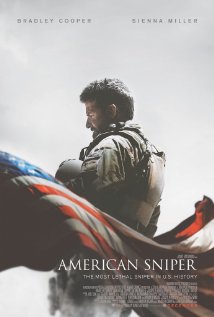
AMERICAN SNIPER
US, 2014, or 132 minutes, Colour.
Bradley Cooper, Sienna Miller, Ben Read, Jake Mc Dorman.
Directed by Clinton Eastwood.
Clint Eastwood, in his own films and in those he directed, has taken us into many war zones, especially in his early years, in the American West and in the police and detective world. In the 1990s, he made Heartbreak Ridge, about American invasions in the Caribbean. But his main war impact was in his treatment of American patriotism in Flags of our Fathers and then looking at the other side of the Pacific battles, Letters from Iwo Jima. Eastwood offered both sides of the war effort, the battles, the strategies, the tactics, the patriotic feelings, both American and Japanese.
With this background in mind, he has now made American Sniper – released when he was 84.
The film is based on an actual character and actual events, especially in Iraqi after 9/11.
Chris Kyle was a sturdy Texan man, the film offerings glimpses of his childhood, his father taking him hunting, training him to kill with accuracy, but also instilling him and his brother with a sense of knowing who were sheep, needing protection, wolves, the bullies, and the sheepdogs, those prepared to care for and defend the sheep. He wanted that role for his sons.
In adult life, Chris and his brother were rodeo riders but, after the news about the massacres by Al Qaeda in Tanzania and Kenya in 1998, Chris enlists and goes through the rigorous training for Navy SEALS. This is captured visually in a collage of moments of training. A bulked-up Bradley Cooper gives one of his best performances as the intense sniper, loving his wife and family, but more at home with his comrades in arms and in action in war.
Besides the sniper action, with which the film opens and then leaves unfinished for about 30 minutes, there is the flashbacks story of Chris Kyle, his meeting Taya (Sienna Miller) in a ba, pleasant repartee, phone calls, dating, engagement, marriage, her pregnancy – but then he is sent to Iraq after 9/11.
The action sequences are quite strongly staged and acted, with Kyle and his skills as a sniper, his accuracy, the number of kills, and his getting a strong reputation with the nickname, Legend. There are scenes of door-to-door knocking to search out insurgents. There are confrontations with local leaders, especially a cruel man nicknamed The Butcher. There is a tense scene where a young boy who picks up a weapon after a man is killed in the street, looking as if to fire it, with Kyle watching, hoping that the boy will drop the weapon and not fire it so that Kyle will not have to shoot him.
Kyle had four tours in Iraq. While it did not take a physical toll on him, it took a psychological toll which he could not appreciate, saying nothing was wrong with him, mouthing patriotic statements about defending his country. But, on his return, he could not fully relate with his wife emotionally which then took its toll on her, especially as at times, he phoned her and action came on the line immediately, she listening to it in dismay.
Dramatically, the film builds up to an engagement which involved an insurgent sniper, Kyle having to make decisions whether to eliminate him or not, what was the best interests of the group, and a storming of the building where Kyle was on the roof by some aggressive militants.
While the screenplay and Eastwood take no explicitly political stands about the American presence in Iraq in its historical post-invasion sense, it shows the American SEALS and military devoted to their task, with spasmodic sympathy for the people whom they sometimes refer to as “savages”.
What the film does do is focus, especially at the end, on the effect of war on the veterans, physical and psychological, after their return.
For audiences who do not know anything about Kyle, there is a surprise ending, and a tribute to him.
Whatever our political viewpoints, whatever our attitudes towards films about war, Clint Eastwood certainly knows how to make involving films.
1. A Clint Eastwood film? His career, films about war, immersing an audience in the experience of war, his perspectives on war, politics?
2. Topical film, actual characters and events, the 21st century, war story? Iraq and the Middle East?
3. The Texas sequences, the countryside, hunting and homes, rodeos? California, life? The detailed training for the Seals? Hospital and veterans?
4. Morocco as standing in for Iraq, the towns and cities, the aerial views, the streets, roofs, the ruins, the homes and interiors? The musical score?
5. Military activities in detail, command, men in the street, the snipers, the attacks, the enemy snipers? Guns, bombardments?
6. Injuries, deaths, the return to the United States, veterans and hospitals?
7. The title, the book, the production and the collaboration of Chris? His death in 2013? A different epilogue with the filming of his burial and content?
8. The opening, on the roof, Chris and the gun, the companion, the woman seemingly pregnant, the boy, then stopping, Chris’s diagnosis, the boy, shooting the boy, the woman getting the bomb, her death?
9. Chris is a boy, hunting with his father, the good shot, the killing of the deer, leaving his rifle on the ground and his father’s reprimand? His father’s affirmation, the meal, the discussion about sheep, wolves as bullies, sheepdogs? His interrogation about the fight on the playground, Chris as a sheepdog defending his brother? The belt on the table, his father saying that they must be sheepdogs and never wolves? The preparation for Chris as an adult, as a SEAL?
10. The adult brothers as cowboys, the rodeo, Chris and skills, his brother’s admiration, going home, the girl and the affair, her being ousted?
11. 1998, television views of the Al Qaeda bombings in Tanzania and Kenya? Television footage, Chris’s patriotic and emotional response, going to enlist, defending his country, the group, the expertise of the training,, the details of the training? SEALS as tough, willing? The spirit? Loyalties?
12. Chris in the bar, Taya and the married man, getting rid of, Chris talking, the repartee? The later phone calls, the dates, the proposal, marriage? The wedding sequence? Getting there appointments?
13. The visuals of 9/11, the impact in the film, the effect on Chris?
14. Taya, pregnant, staying at home, phone calls and hearing the action in Iraq? The distance, the effect of her pregnancy, Chris’s return, the ultrasound, driving away, turning back immediately the boy? The reticence of birth sequence? The boy growing up, the years passing, the daughter, Chris on leave, present and not present?
15. The character of tape or from offhand girl in a bar, to date, who growing older, the marriage, the children, a love the Chris, listening to on the phone, her grief when he returned from tours and was so detached, finding that he was more alive in Iraq and on tour?
16. The four tours? The development of war and resistance in Iraq? Insurgence? The American control? The clashes?
17. Chris as a sniper, his kills, the overview of his career? The setups, his accuracy, his nickname as Legend?
18. Chris is a person, his age, the experience of war, the effect of marriage, his fatherhood? Mentioning his father, his brother signing up, seeing his brother and his disillusionment, getting out?
19. The variety of incidents: in the house, the boy and his family, the interrogation, the pressure, information, the father going to the Butchers house, the
informant being killed? The peaceful meal, Chris finding the arms cache, the shootings, the funeral, the men in protest against the Americans? The little boy in the street, the victim of a sniper, picking up the weapon, Chris willing him to put it down?
20. The streets, search by door knock, the deaths, the Iraqi snipers, injuries and American deaths?
21. Chris at home, meeting the veteran he had saved and had lost his leg, thanks? Biggles, his being shot, in hospital, Chris’s visit, his death? Meeting the veterans? Chris going out with the veteran, the veteran killing him?
22. Action, on the roof, the wall with the gate, the sniper killing the Americans, at the wall, their looking in the wrong direction? The long distance, Chris taking him out? The orders not to, his comrades encouraging him? The invasion of the many soldiers, into the building, the fight, the shootings, the helicopter, the sandstorm, Chris and their holding the helicopter, his escape?
23. His return home, going to the bar, phone call, delaying? In the backyard and the threat of the dog and his reaction? Going to the psychologist, and
questions? Visiting the vets?
24. Clint Eastwood and the politics of the Middle East wars, of the American presence, dealing with the locals, the antagonism, calling them savages? The
screenplay not being explicitly anti--Islam? Koran and Bible? Chris proud, ready to meet his meet his creator?
25. His whole life before him, the irony of his being killed by a soldier? The epilogue ceremonies, ritual and salute?
Published in Movie Reviews
Published in
Movie Reviews
Tagged under